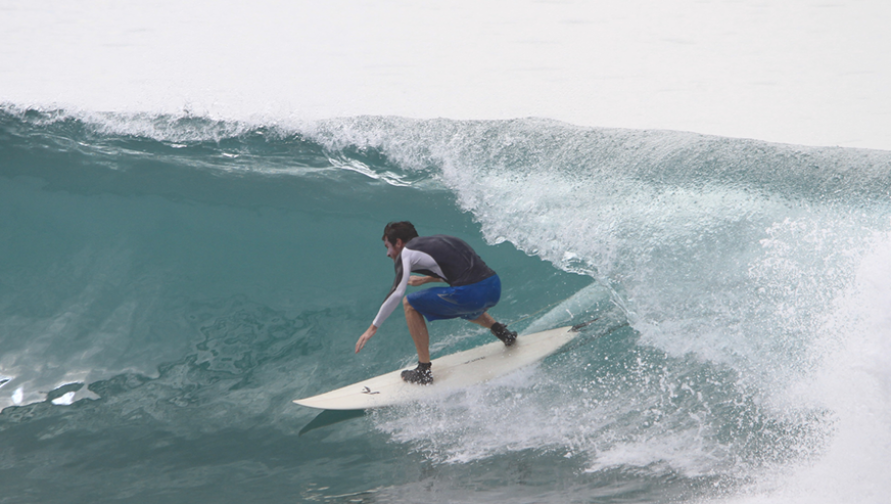
By Annabel Adams with an excerpt from Surfing with Sartre by Aaron James
What does the surfer know about living a meaningful life and adapting to a changing planet? This question is the inspiration behind Surfing with Sartre: An Aquatic Inquiry into a Life of Meaning (Doubleday, 2017) by University of California, Irvine Professor of Philosophy Aaron James.
A surfer-philosopher himself, James has often found that surfing and philosophy converge in interesting ways. In fact, it was the “asshole surfer” who sparked the idea for his popular book, Assholes: A Theory (Doubleday and Anchor, 2012 & 2014). In Surfing with Sartre, however, James approaches the surfer as a possible icon for living an adaptively-attuned life; that is, living in partnership with changing natural phenomena rather than in opposition to it, finding awe in the natural world, and engaging in capitalism only in so far as it furthers one's freedom to live a surfer’s life. Antithetical to the workaholic, whose quest for more—in all its forms—consumes more of the world’s natural resources, the surfer’s quest is neither for less nor more, but for enough.
Written in conversation with a variety of well-known philosophers, James finds his main opponent in Jean-Paul Sartre, the mid-twentieth-century French philosopher whose dark existential worldviews are rebuffed by the surfer’s intrinsic harmony with the state of things.
Below, we’ve provided an excerpt from Surfing with Sartre that focuses on seven life philosophies we can borrow from surfers to become more adaptive, attuned and sustainable in how we interact with the natural world and those we share it with.
“Is there a self-help guide to surfer success? Perhaps, in these seven steps:
First, take it easy. Enjoy the fine weather. Watch the waves. Maybe go for a paddle if the waves aren’t doing it today. Chillax. For those of a non-aquatic lifestyle, take ample time in leisure, and don’t try to do too much. Leave time for becoming attuned to your books or your music, your garden, or the birds in your neighborhood.
Second, accept. Accept your present circumstances. Because nothing interrupts attuned adaption to this coming moment like resisting the fact that one is, for now, where one is. Seek reconciliation. Check feelings of entitlement. Cultivate grace and gratitude.
Third, persist. Get into a nice rhythm. Check the waves daily. Surf around work. In good or bad waves. Eat. Sleep. Relax with a friend or your children. Repeat. For the non-aquatic, persist in learning or in a creative project.
Fourth, focus. Do what is most worth doing. Pass on what is not. Skip other fine and good activities in order to focus your attention on waves and surfing them.
Fifth, leave time. Don't blow a lot of time in mere entertainment, let alone get yourself tied up in a time sucking, high-maintenance house, even if you can afford it. Keep the schedule light, so you can be on it when the waves turn on. When the waves are flat, or you're in a creative lull, seize the day to get miscellaneous tasks done efficiently, so as to free up more time for the most worthy activities. Most important, in a world of long workweeks, e-mails never leaving you alone, of "stacked" schedules and a zillion empty activities performed in the name of a supposedly "full life," the one thing to control is your time. With vigor and virtue, protect it against an out-of-control, money-hungry work culture that cares not about how much you surf, or your quality of life, and that threatens to devour it.
Sixth, with all good wishes of peace for your fellow man and woman, let your watchword be “What are the Joneses to me?” Resist comparing yourself with them, and look away when you do. If they’re confused enough to blow their time and stretch their resources on an even bigger house, even pricier cars, and ever more demanding jobs to pay for all this, the proper response is not envy but sympathy. Sadly for them, they aren’t fortunate enough to be surfers. If they are surfers, they may be confused. And if the surfer Joneses seem to have everything—including enviable regular surf trips to world-class waves, with photographs for you to see regularly on Facebook—well, gosh, I know, that’s harder. But maybe just focus on the waves near home and the very good life you have (and check social media a lot less).
Seventh, mix it up. As the seasons change, switch up surf breaks and equipment. In California, when the swells come from the South Pacific, from mid-spring through mid-fall, you’ll probably want to surf the south-facing breaks, and then in winter, with chillier air and water temps, the north-facing breaks. Push yourself a little, so as to keep things interesting. And maybe, so as to constantly progress rather than stagnate, try different surfboard shapes. Each one helps you see the wave slightly differently, so as to take a different, new approach and develop your surfing in a new direction. Try playing a new instrument. Do a new kind of art or craft project. Read a new genre of books.
Originally published in the UCI School of Humanities' magazine, "Nature and Place," 2017.
